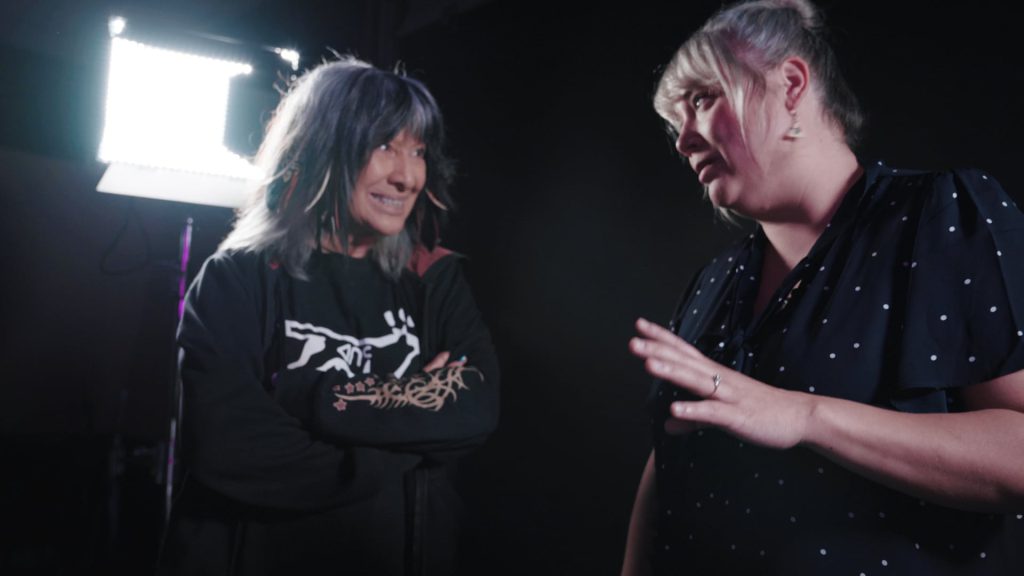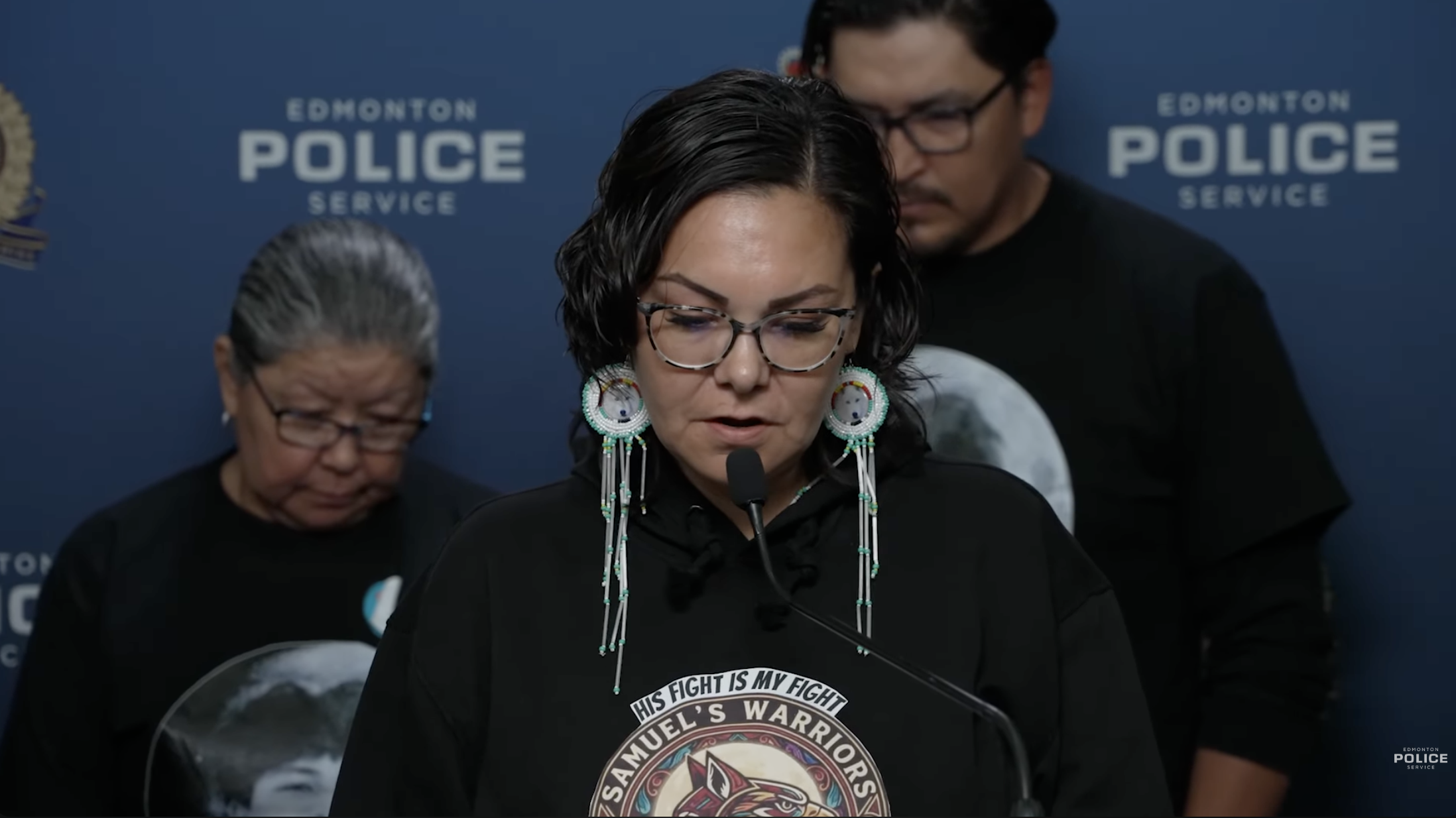Podcast digs into story of enduring icon Buffy Sainte-Marie
‘She has always been there for us,’ says Falen Johnson, who hosts the five-part CBC podcast ‘Buffy’


Buffy Sainte-Marie’s legacy has been present in Falen Johnson’s life as far back as she can remember — an experience common for many other Indigenous people who have a special love for the folk-rock icon.
“She has always been there for us,” Johnson tells IndigiNews.
“A lot of people remember seeing her on Sesame Street, or a lot of people remember hearing her music in the car on the way to a powwow.”
Johnson’s admiration and gratitude for the star is woven into her new podcast Buffy. The five-part CBC series, which debuted on National Indigenous Peoples Day, dives deep into Sainte-Marie’s legacy and past.
“We walk you through the life of Buffy Sainte-Marie,” says Johnson. “We wanted to paint a fuller picture of her life.”
Johnson is Mohawk and Tuscarora from Six Nations and was named one of 20 people to watch in 2020 by Maclean’s. She is also the co-host of the CBC podcast the Secret Life of Canada.
Johnson says, with Buffy, it became clear that other Indigenous people had a similar experience as she did with Sainte-Marie being a constant figure in their lives.
“I asked [Indigenous musician] Jeremy Dutcher, ‘Do you remember when you first saw her, heard her, and knew who she was?’ He tried to answer it. And he was like, ‘I can’t,’” says Johnson.
“That made me feel like we were on the right track with thinking that there is this group of Indigenous people who just always knew she’s been there for us.”
The podcast features new interviews with Sainte-Marie, her childhood friend Janice and her high school boyfriend Peter Dustin. It also samples some of Sainte-Marie’s songs and recordings of old interviews.
“In Indigenous country Buffy is it. She is the musician, the artist,” Johnson says in her podcast. “In short, we Indigenous people think about Buffy as the most celebrated Indigenous musician ever.”

An iconic legacy
Sainte-Marie was the first Indigenous person to win an Academy Award, helped create the Juno Awards category for Indigenous musicians and has influenced countless contemporary artists.
“Everyone should know about her contributions to music. She made the first Internet album and created genres like powwow rock [and] disco powwow,” Johnson says.
Sainte-Marie has 21 albums, 15 honorary doctorates, and more than 40 artistic awards and humanitarian honours. Cher, Barbra Streisand, Janis Joplin, Elvis Presley, and Courtney Love, to name a few, have covered Buffy’s songs. She is also an advocate for human rights.
As Johnson recounts, Sainte-Marie was scooped in the early 1940s, before the “official” start of the 60s Scoop and was adopted by a white presenting family. When she got older, she was able to connect with other Indigenous people, went to college, and then went on the road with her music.
“[Buffy] lived in a mostly white town and somehow found her way to the only Indigenous people in her city,” says Johnson, alluding to the stories about Sainte-Marie in the podcast.
Sainte-Marie met a Narragansett man who “taught her how to bead and she taught herself piano and guitar,” Johnson adds.

Ahead of her time
Sainte-Marie is a trailblazer and is still going strong. The series looks back on her career, what she has come up against and her outspoken nature.
“The music industry is difficult for women. It is male-dominated and misogynistic. It is not an easy space for women to be in,” Johnson says. “Buffy is a brown Indigenous woman who was pushing her way through and being on the road by herself.”
Sainte-Marie has long been vocal about abuse and mistreatment toward women and Indigenous people. At times, Johnson says, Sainte-Marie was talking about things that are sometimes considered shameful and was ahead of her time.
“[Buffy] had a doctor who over-prescribed her codeine and didn’t tell her what she was taking, this was in the 60s.”
Sainte-Marie was able to recover from the addiction, and spoke candidly about her experiences. For Johnson, Buffy talking openly about addiction and recovery in the 60s seems unbelievable.
“This is huge, it’s so taboo for Indigenous people to say anything about addiction and saying that in a major publication, it feels like it’s not even brave, it feels like it wouldn’t even be a possibility.”
Passing the mic
Sainte-Marie has also lived through a lot of “short windows in time where it seems like non-Indigenous people are seeing us and are listening to us,” says Johnson. These include the Oka crisis, Wounded Knee and the occupation of Alcatraz, and — recently — the identification of 215 unmarked graves near the former Kamloops residential “school.”
Through all of this, Sainte-Marie has used her songs to call for change and encourage compassion. Johnson says she hopes the podcast amplifies this work.
“Buffy has lived through so many of those moments that I wanted to find a way to channel her optimism. I wanted to look to Buffy as an example to be more generous and be less pessimistic and jaded.”
With Sainte-Marie, she is conscious of her position in the spotlight and uses it to raise awareness about the people who are on the ground creating change. For example, the podcast tells the story of how Sainte-Marie supported the occupation of Alcatraz in the ‘60s by playing a benefit concert and donating her proceeds to the cause.
“She is never condemning, shaming, or pointing the finger at anyone,” Johnson says.
“She’s inviting them into her music, inviting them into her story. Because people don’t listen when you yell in their face. Buffy’s music is a masterclass in that.”
While the podcast details how Sainte-Marie uses her power, it also explores the dark forces she came up against: In the ‘60s and ‘70s, Sainte-Marie was blacklisted from the radio. Her music was considered too dangerous because of her large audience and influence, Johnson says.
“That platform was huge … she was reaching too many people. And the easiest way to do that is to take all her records off the radio and shut her down.”
Despite being blacklisted, Sainte-Marie’s career and artistry didn’t end. She went on to release albums in the ‘80s, ‘90s, 2000s, and 2010s. She had a five-year run on Sesame Street in the ‘80s, has been releasing children’s books in the 2020s, and continues to tour.
Sainte-Marie’s commitment to uplifting Indigenous people is lifelong and has been evident since the early days of her career, Johnson says.
“She was always holding space for us, making sure that people never forgot we existed,” she says.
“It is immeasurable, her commitment to holding space for us.”
Author
Latest Stories
-
‘Bring her home’: How Buffalo Woman was identified as Ashlee Shingoose
The Anishininew mother as been missing since 2022 — now, her family is one step closer to bringing her home as the Province of Manitoba vows to search for her
-
Samuel Bird’s remains found outside ‘Edmonton,’ man charged with murder
Officers say Bryan Farrell, 38, has been charged with second-degree murder and interfering with a body in relation to the teen’s death
-
Book remembers ‘fighting spirit’ of Gino Odjick, hockey’s ‘Algonquin Assassin’
Biography of late Kitigan Zibi Anishinabeg left winger explores Odjick’s legacy as enforcer in the rink — and Youth role model off the ice













